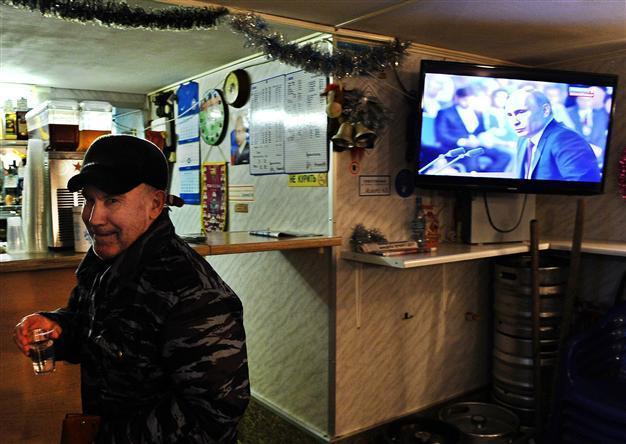Crimean winemakers eye Russian drinkers
SEVASTOPOL - Agence France-Presse

A file picture taken on December 19, 2013, shows a man carrying his drink in a vodka bar in Saint-Petersburg during the broadcast of President Vladimir Putin's annual press conference. AFP photo
Wines from the sunny hillsides of Crimea have been popular with Russians since the time of Tsar Nicholas II - and now some vineyard owners are hoping their new union with Moscow could boost business despite the winds of war.
French actor Gerard Depardieu is among those reportedly to have invested in Crimean vineyards but most of its 25,000 hectares are owned by small businessmen like Pavlo Shvets of the Uppa Winery, southeast of Sevastopol.
"I think for business, for wine production, selling wine directly to Russian buyers would be a lot better," Shvets told AFP.
"The Russian market is a lot bigger, richer and is developing faster than the Ukrainian one. That's a fact."
Agriculture is one of Crimea's biggest earners, making up 10 percent of gross regional product, and grape growing accounts for 10 percent of that, mainly in the south.
But Ukraine's economy is fragile - its new government says it needs $15 billion to stabilise and restructure while analysts warn it could be set for a debt default.
Many people who voted for closer ties to Moscow in Sunday's referendum cite the economy as a major motivator.

French actor Gerard Depardieu is among
those reportedly to have invested in
Crimean vineyards. AFP photo
Let's toast to peace, and businessShvets, a sommelier in Moscow for 15 years before buying his ten-and-a-half hectare vineyard, employs 12 people and produces around 30,000 bottles a year of wines like Pinot Noir and Riesling.
He sells half in Ukraine and exports the other half to Russia but hopes this could increase in future.
"If you talk only about market and about business, I think for my business it will be better if Crimea will become part of Russia," he added.
Conditions for doing business under Russia could also be better than they are now, he said.
He is frustrated that a licence to sell alcohol in Ukraine costs 50,000 euros a year and said the Russian government gives incentives to small growers.
Shvets's vineyard is accessible only by a dirt track so steep that the vineyard's van stalls repeatedly on the way up.
Overlooking the valley below as spring sunshine beats down, foreman Aleksiy Apetsko said the culture of drinking wine rather than traditional vodka was bigger in Russia than in Ukraine.
"Maybe it is when people have more money and start to travel more they start to be more interested," he added.
The vineyard is looking to create a tasting area in the hope of attracting some of the tourists who make up Crimea's other main source of revenue.
At the Inkerman winery just outside Sevastopol, which sells 60 percent of its wine in Ukraine and exports 20 percent to Russia, head of production Larissa Shymchok was more diplomatic.
"We don't do politics, our wine is drunk in Russia and in Ukraine and we hope that it will be drunk in France one day," she said.
Inkerman is one of Crimea's biggest and most popular wines, with up to 36 million bottles sold per year.
"We're a bit worried for our vineyard. We are peaceful people, our profession is about passion and we hope that everything will be good in Crimea and in Ukraine," she said.
Famed for its beaches, temperate climate and historic towns like Sevastopol, home of Russia's Black Sea Fleet, Crimea draws thousands of tourists per year, with around 60 percent from Ukraine and 20 percent from Russia.
Some tour operators are fearful of the impact from the tensions, with a knock-on effect for vineyards.
"Lots of tour companies have cancelled their trips to Crimea, to Ukraine in general because of the conflict which everyone is concerned about," said Lilia Ivanova of Intourist, the former Soviet state tour agency which is still a major player in the market.
Despite the valuable boost which closer ties with Russia could bring to winemaking, Shvets said he personally shared this ambivalence about the current situation.
"People here are afraid of war," he added. "I think only time will show us which possibility is better."

